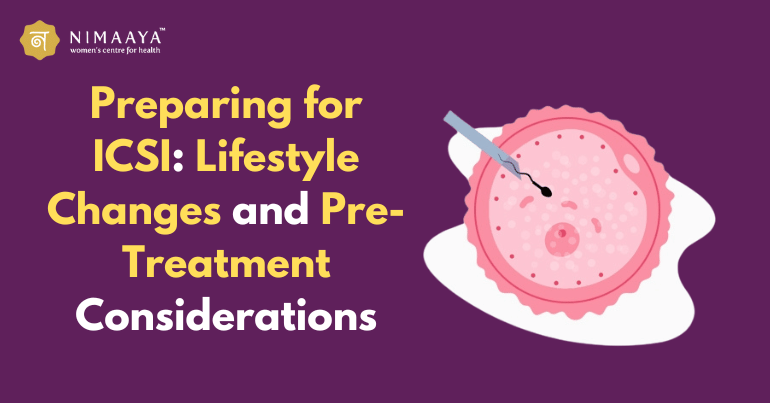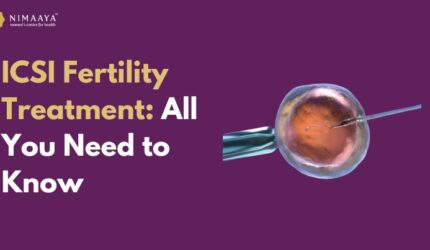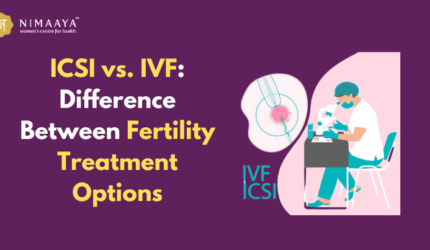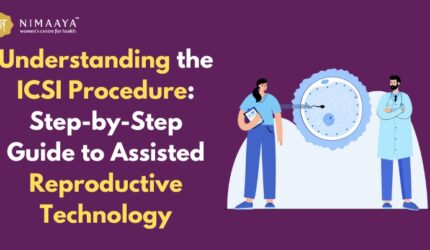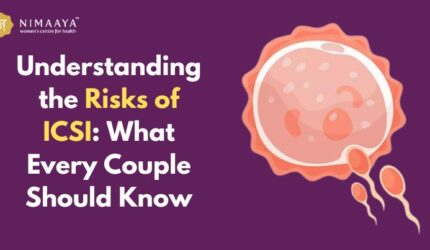Embarking on the journey of preparing for ICSI (Intracytoplasmic Sperm Injection) treatment can be both exciting and daunting. For couples navigating fertility challenges, ICSI offers a beacon of hope in realizing their dream of parenthood. However, to optimize the chances of success, it’s crucial to understand the significance of lifestyle adjustments and thorough pre-treatment preparations. In this guide, we’ll delve into the essential considerations, from the timeline of ICSI treatments to the role of fertility specialists, and Preparing for ICSI shedding light on each step towards achieving the ultimate goal of parenthood.
What is ICSI Treatment and Its Preparation?
ICSI, or Intracytoplasmic Sperm Injection, is a highly specialized form of assisted reproductive technology (ART) used to treat male infertility issues, such as low sperm count or poor sperm motility, by directly injecting a single sperm into an egg to facilitate fertilization. Preparing for ICSI treatment involves several key steps to optimize the chances of success. Firstly, thorough pre-treatment evaluations and consultations with fertility specialists are essential to assess both partners’ medical history, conduct diagnostic tests, and devise a personalized treatment plan.
Lifestyle adjustments, including maintaining a healthy diet, regular exercise, and avoiding harmful habits like smoking and excessive alcohol consumption, can positively impact fertility outcomes. Additionally, couples are advised to address any underlying health conditions and optimize their overall well-being before commencing treatment. Financial planning is also crucial, as ICSI procedure costs can vary, and exploring potential financial assistance options can alleviate the financial burden associated with treatment. Overall, thorough preparation ensures that couples are equipped with the necessary knowledge, resources, and support to embark on the journey of ICSI treatment with confidence and optimism.
Importance of ICSI Preparation
The importance of ICSI preparation cannot be overstated. Thorough pre-treatment evaluations, lifestyle adjustments, and consultations with fertility specialists lay the groundwork for a successful journey towards parenthood. By addressing underlying factors, optimizing reproductive health, and understanding the intricacies of the Preparing for ICSI procedure, couples can enhance their chances of achieving their dream of conception.
Navigating Preparation for ICSI Treatment
Preparing for ICSI treatment requires careful planning, proactive engagement with healthcare providers, and a holistic approach to reproductive health. By taking proactive steps to educate yourself, address lifestyle factors, and seek support when needed, you can optimize your chances of success and embark on your journey towards parenthood with confidence and resilience.
➼ Consultation and Evaluation:
Begin by scheduling a consultation with a fertility specialist to assess your specific situation. They will evaluate both partners to determine the most suitable course of action, which may include ICSI (Intracytoplasmic Sperm Injection) as a treatment option.
➼ Understanding the Procedure:
Educate yourself about the ICSI procedure, its steps, success rates, and potential risks or complications. This knowledge will help you make informed decisions and manage expectations throughout the process.
➼ Lifestyle Adjustments:
Take proactive steps to optimize your health and fertility potential. This may involve adopting a balanced diet, maintaining a healthy weight, quitting smoking, limiting alcohol intake, managing stress, and incorporating regular exercise into your routine.
➼ Medication and Hormonal Stimulation:
If recommended by your fertility specialist, undergo any necessary hormonal stimulation or medication protocols to Prepare for the ICSI procedure. Follow the prescribed regimen diligently and communicate any concerns or side effects with your healthcare team.
➼ Emotional Support:
Acknowledge the emotional toll that infertility and assisted reproductive technologies can have on individuals and couples. Seek support from loved ones, infertility support groups, or mental health professionals to cope with the stress, anxiety, and uncertainty associated with the journey.
➼ Financial Planning:
Understand the financial implications of ICSI treatment, including ICSI procedure cost, related to consultations, diagnostic tests, medications, procedures, and potential additional cycles if needed. Explore insurance coverage options, fertility financing programs, or grants to alleviate some of the financial burdens associated with fertility treatments.
Day-by-Day Breakdown of the ICSI Procedure
The ICSI procedure unfolds over several days, each marked by specific milestones and procedures. From ovarian stimulation and egg retrieval to fertilization and embryo transfer, understanding the day-by-day progression of the treatment can empower you to actively participate in the process. Moreover, staying informed allows you to communicate effectively with your healthcare team and address any concerns promptly.
• Ovarian Stimulation:
The process typically begins with ovarian stimulation, where medications are administered to stimulate the ovaries to produce multiple follicles containing eggs. Daily injections or oral medications may be prescribed to regulate hormone levels and optimize egg production. During this phase, regular monitoring through blood tests and ultrasound scans helps track follicular development and adjust medication dosages as needed.
• Egg Retrieval:
Once the follicles reach optimal maturity, the next step is egg retrieval. This minor surgical procedure is performed under sedation or anaesthesia, usually taking place around 36 hours after a trigger injection to induce final maturation. A needle is inserted through the vaginal wall into each follicle, and the eggs are aspirated one by one. The retrieved eggs are then carefully examined in the laboratory to assess their quality and maturity.
• Fertilization:
Following egg retrieval, the eggs are immediately transferred to the laboratory for fertilization. In the case of ICSI, a single sperm is injected directly into each mature egg to facilitate fertilization. This precise technique increases the chances of successful fertilization, particularly in cases of male factor infertility or previous failed fertilization attempts with conventional IVF. The embryologist monitors the eggs closely for signs of fertilization and early embryo development over the next 24 to 48 hours.
• Embryo Culture and Monitoring:
Fertilized eggs, now embryos, are cultured in a specialized incubator under controlled conditions to support their growth and development. The embryologist monitors the embryos closely, assessing their quality based on criteria such as cell division rate, symmetry, and fragmentation. Embryo development is typically observed for three to five days before selecting the highest-quality embryos for transfer.
• Embryo Transfer:
The final stage of the ICSI procedure is embryo transfer, where one or more embryos are carefully transferred into the uterus. This typically occurs three to five days after egg retrieval, depending on the specific protocol and embryo development. The procedure is performed in a clinical setting and does not require anaesthesia. Using a thin catheter, the embryos are gently deposited into the uterine cavity under ultrasound guidance. Following the transfer, patients may be advised to rest briefly before resuming normal activities.
Understanding the ICSI procedure day by day empowers patients to actively engage in their treatment journey. By staying informed about each stage, individuals can communicate effectively with their healthcare team, ask pertinent questions, and address any concerns promptly. This proactive approach fosters a sense of collaboration and partnership between patients and providers, ultimately enhancing the overall experience and optimizing the chances of a successful outcome.
Understanding the ICSI Treatment Timeline
Familiarizing yourself with the ICSI treatment timeline is crucial for effective preparation. While the specifics may vary from one individual to another, a typical timeline involves several key stages. From the initial consultations and diagnostic tests to ovarian stimulation, egg retrieval, fertilization, embryo transfer, and subsequent monitoring, each phase plays a pivotal role in the overall success of the procedure. By understanding what to expect at each stage, couples can better prepare themselves both emotionally and practically.
Success Rates of ICSI Treatment
Understanding the ICSI success rate in India provides couples with realistic expectations and empowers them to make informed decisions. While success rates vary depending on individual circumstances, factors like age, reproductive health, and treatment protocols influence outcomes. Consulting with experienced fertility specialists or the Best Gynecologist in Surat, such as those at Nimaaya IVF Center, offers insights into personalized success probabilities and alternative options. Remember, success is not solely measured by conception but also by the resilience and perseverance displayed throughout the journey.
Conclusion:-
Preparing for ICSI involves a multifaceted approach encompassing lifestyle adjustments, financial planning, and collaboration with ICSI fertility specialists. By understanding the ICSI treatment timeline, addressing the cost considerations, and leveraging the expertise of renowned centres like Nimaaya IVF Surat, couples can embark on this journey with confidence and optimism. Ultimately, with perseverance, support, and the right resources, the dream of parenthood can become a reality, enriching lives and fostering new beginnings.

